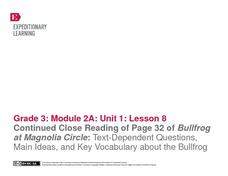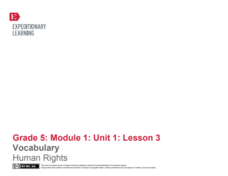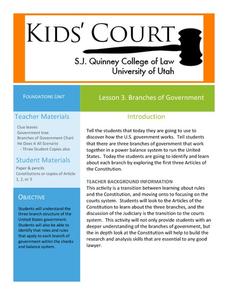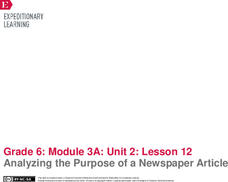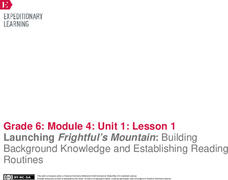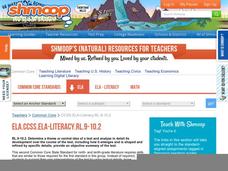Curriculum Corner
Guest Teacher Plans: Kindergarten
Emergencies happen. Be prepared the next time you have to call in a substitute with a lesson plan designed to meet the needs of a kindergarten class. Throughout the day, class members work with number and alphabet cards, identify numbers...
EngageNY
Close Reading of That Book Woman: How Did People Access Books in Rural Areas of the United States?
For this ninth lesson plan in a larger beginning-of-the-year unit, close reading skills are used independently to find the gist of the story That Book Woman. Rereading for important details is the targeted skill to unlock a deeper...
EngageNY
Close Reading: The Introduction to the Universal Declaration of Human Rights
As part of a group of lessons, your class will return to the primary text for this unit, the Universal Declaration of Human Rights. Key vocabulary as well as close reading strategies continue to be the focus skills; however, this lesson...
EngageNY
Taking Notes Using a Graphic Organizer: Inferring About Work and Play in Colonial America
What was life like in colonial America? Follow this lesson and your pupils will find out what people in colonial times did for work and for fun. Ask learners to compare and contrast the two texts and explain what the reading helped them...
EngageNY
Close Reading of Bullfrog at Magnolia Circle: Text-Dependent Questions, Main Ideas, and Key Vocabulary about the Bullfrog
As your 3rd grade class finishes reading Bullfrog at Magnolia Circle, the eighth lesson plan of this unit helps readers from an understanding of the very specific information on the final page of the book. As with the entire unit,...
National Math + Science Initative
Reading an Informational Text: "It All Started with Sputnik"
Sputnik was one of the greatest scientific advancements of the 1950s, and this reading lesson does it justice. Pupils start off with pre-reading questions and a video. They then read an excerpt from an article, which is accompanied by...
EngageNY
Grade 9 ELA Module 4, Unit 1, Lesson 3
What is the connection between the spread of ideas and the expansion of the sugar trade? Class members continue their reading of Sugar Changed the World and use an analysis tool to identify how critical ideas in the chapters are...
Curated OER
Keywords: A Memorization Strategy
Here is a fabulous, five-page lesson plan on how keywords can help a reader with his/her reading comprehension. After a teacher-led discussion, pupils pair off with each other and work together to identify the main idea in a passage of...
Ontario
Reading Informational Text
Learning to recognize the importance of the features of information text (i.e., titles, subtitles, endnotes, sidebars, etc.) is the focus of a reading activity designed for middle schoolers. Learners examine how these text features help...
EngageNY
Close Reading of Nasreen's Secret School: How Do People Access Books in Afghanistan?
Third graders continue to practice the close reading skills of capturing the gist and reading again for important details in the sixth lesson in a larger unit. This is a great beginning-of-the-year unit for establishing visible thinking...
EngageNY
Vocabulary: Human Rights
Your class continues to explore the history of the Universal Declaration of Human Rights. In addition to learning about the background of this text, learners work on the skill of identifying and understanding key academic vocabulary....
Curated OER
Lesson 3: Branches of Government
Young historians climb through the three branches of the US government in the third activity of this five-part series. While reading the first three Articles of the Constitution in small groups, children write facts on paper leaves that...
Smekens Education Solutions, Inc.
Introducing the 6 Traits to Students
Put together an English language arts unit on the six traits of writing with this helpful collection of resources. From fun songs to differentiated writing exercises reinforcing each of the traits, great ideas are provided for developing...
Houghton Mifflin Harcourt
Nature Walk: English Language Development Lessons (Theme 2)
Walking in nature is the theme of a unit designed to support English language development lessons. Scholars look, write, speak, and move to explore topics such as camping, woodland animals, instruments, bodies of water, things found at a...
EngageNY
Reading for Gist: “Middle Ages” Excerpt 2
Read and repeat. Scholars repeat the strategies for digging deeper into text from lesson two. This time they focus on Middle Ages Excerpt 2. Learners write unfamiliar words in the word catcher and use details from the text to add to the...
University of Kansas
Newspaper in the Classroom
Newspapers aren't only for reading—they're for learning skills, too! A journalism unit provides three lessons each for primary, intermediate, and secondary grades. Lessons include objectives, materials, vocabulary, and procedure, and...
Prestwick House
Rhyme and Repetition in Poe's "Annabel Lee"
Many and many a year ago Edgar Allan Poe crafted the chilling tale of "Annabel Lee." The poem is the perfect vehicle to introduce Poe's concept of unity of effect, the idea that every element in a poem or story should help to develop a...
Alberta Learning
Great City-states of the Renaissance
Acting as journalists on a team to determine the most influential city-state of Renaissance Italy, your young historians will research, discuss, and compare the rise of Venice, Florence, and Genoa, and their influence in shaping a...
EngageNY
Analyzing the Purpose of a Newspaper Article
Shh! No talking during the discussion! Using the resource, scholars engage in a silent discussion called a Chalk Talk activity to analyze the purpose of a newspaper article. Additionally, they read a model newspaper article and try to...
EngageNY
Launching Frightful’s Mountain: Building Background Knowledge and Establishing Reading Routines
Welcome to Frightful's Mountain. The teacher introduces scholars to the text Frightful’s Mountain by reading the first chapter aloud. Learners then talk with a partner about the text. The instructor models answering focus questions as...
Gourmet Curriculum Press
Author's Purpose
Who knew determining author's purpose could be turned into a game? Four teams compete to correctly identify the author's purpose for writing a series of passages.
Shmoop
ELA.CCSS.ELA-Literacy.RL.9-10.2
Identifying the theme or central idea of a text is a skill many young readers struggle with. It is also the second standard for reading literature in the Common Core. This resource, one from a series of Common Core lessons, can provide...
What So Proudly We Hail
A Lesson on Benjamin Franklin’s “Project for Moral Perfection”
Benjamin Franklin identified 13 virtues that he felt would strengthen his character if he could focus on each one. A thorough lesson plan explores high schoolers' personal values in the context of their lives, and compels them to strive...
Curated OER
Mini-Lesson Planning for Inferences
Making inferences and drawing conclusions is a key component to successful active reading. Encourage your class to use context clues and prior knowledge to infer different elements of a story, including the setting, plot, and character...






